Introduction
The broad discussion in many circles about the plight of the non-prime consumer often uses assumptions about how these consumers think, what matters to them, and even what would be good for them. However, there is limited data that really explains their circumstances.
For this study Elevate’s Center for the New Middle Class set out to understand the differences in attitudes, experiences and behavior in romance and dating among single adults in the United States, and how it relates to finances.
This study represents results from a survey of 708 single adults 18-44 in the United States. Of the 708, 340 self-identified as having non-prime credit scores and 368 self-identified as having prime credit scores.
Interviews were conducted December 13, 2018- December 31, 2018.
Non-prime Americans

“Non-prime Americans” represent the New Middle Class. These are Americans with a credit score below 700, meaning that their access to credit is limited or curtailed. Non-prime is also often further divided into “near prime,” “sub-prime,” and “deep sub-prime.” “Invisibles” are people who are unlikely to have a credit score at all because they have so little credit history.
It is the Center’s objective to better understand non-prime experiences, attitudes, and behavior.
The following report seeks to understand the financial experience of prime, non-prime, and credit invisible Americans in the United States. This does so by comparing them to the general population.
Key Topline Findings
•Non-prime and prime singles value similar qualities as their top factors in choosing romantic partners, but they differ when it comes to finances
•Credit status has no bearing when it comes to the top 5 factors that both groups place highest importance on: trust, honesty, communication compatibility, and sexual chemistry.
•However, the non-prime singles are more likely to say that honesty and trust are “very important.”
•They are also more likely to place importance in sexual chemistry- about 9 in 10 non-prime singles say it’s “very important” or “important,” compared to 8 in 10 prime singles
•Prime and non-prime singles alike place high value on spending time with a partner as a way of showing you care, with about 8 in 10 singles sharing this belief.
•Debt and financial stability are significantly less important to non-prime singles
•Non-prime singles are less likely to discuss finances in the first 3 months of a new relationship.
•And they’re less likely to snoop on a potential partner’s career info to look up possible salary ranges before determining whether to pursue a relationship.
•Single non-prime women have the least positive dating experience
•Non-prime women are the least likely to say their financial situation gives them confidence in dating.
•They have the least positive experiences compared to any group with meeting dating prospects through shared interests, at social functions or bars, and via setups from family and friends, and compared to their prime counterparts they are less likely to have positive experiences with online dating.
•Non-prime women are most likely to say they’ve had a relationship unravel due to their partner’s finances and more likely than non-prime women to say they’ve had a partner who was dishonest about finances, which might explain why 83% say it’s important to maintain financial independence in a relationship and 86% say job stability is important in selecting a romantic partner.
•Single non-prime men are the least judgmental when it comes to financial factors in dating
•They are less likely to say they’ve hesitated on messaging someone based on career information.
•They are less likely than any other group to say financial stability is important in selecting a romantic partner.
•And they’re less likely to say a partner’s finances caused a relationship to unravel, compared to both prime men and prime women.
•They’re less likely than any other group to say they’re hesitant to date someone who is unemployed and they place the least importance compared to other groups on job stability in selecting a romantic partner.
•And they’re less likely than any other group to believe partners need to be financially equal or that finances even need to be a consideration.
Dating and relationships
Relationship status
There are no significant differences in relationship status between non-prime and prime singles.
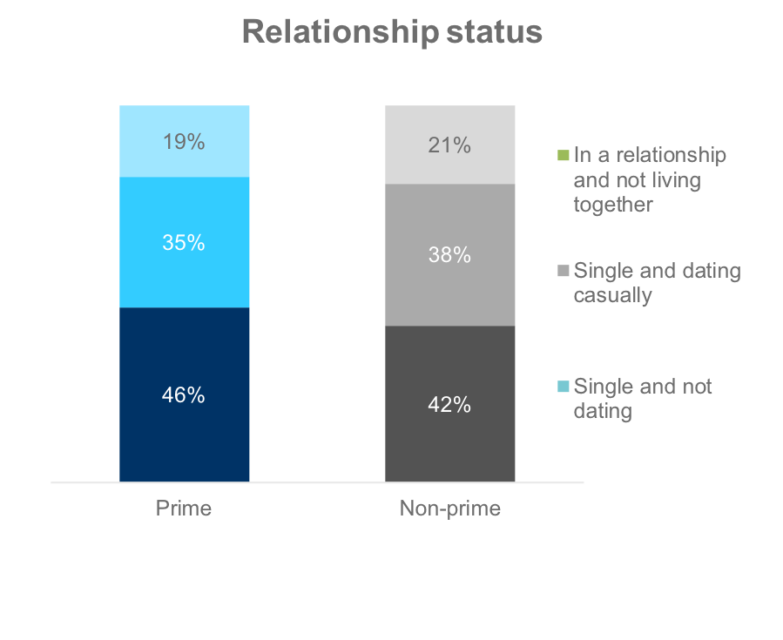
Q4- Which of the following best describes your current relationship status?
Meeting dating prospects
Online dating is the top method for meeting new dating prospects, followed by setups from friends and family and social functions/bars, and shared interests.
Incidence of online dating does differ significantly between prime and non-prime singles, and pay-to-play might be a factor.
Non-prime singles are less than half as likely to turn to professional matchmakers.
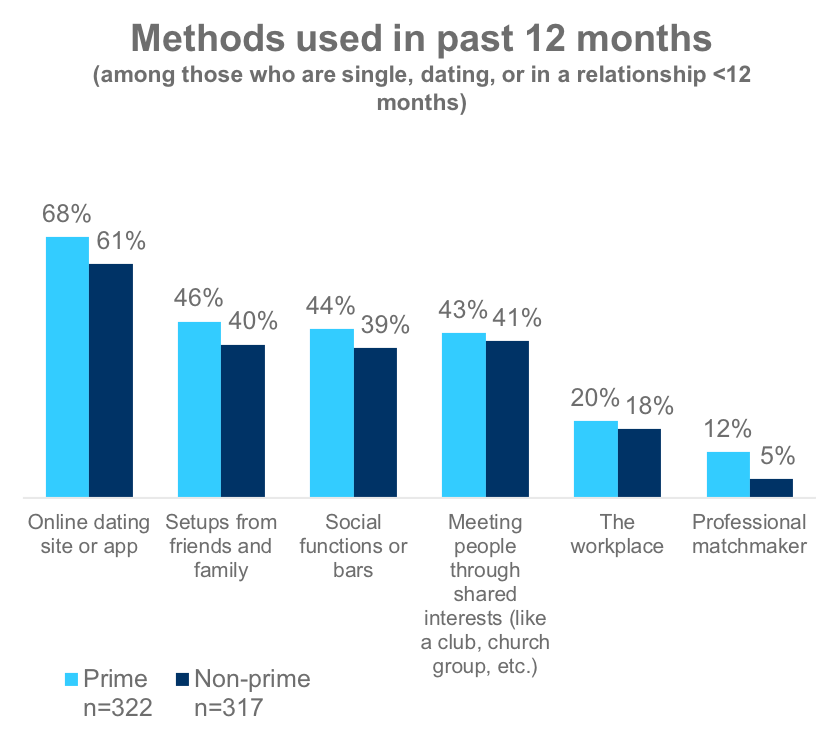
Q11- Which of the following have you utilized to meet new dating prospects in the past 12 months? Please select all that apply
How you met current partner
About 1 in 3 of those in a relationship met their partner online. There are no key differences between prime and non-prime.
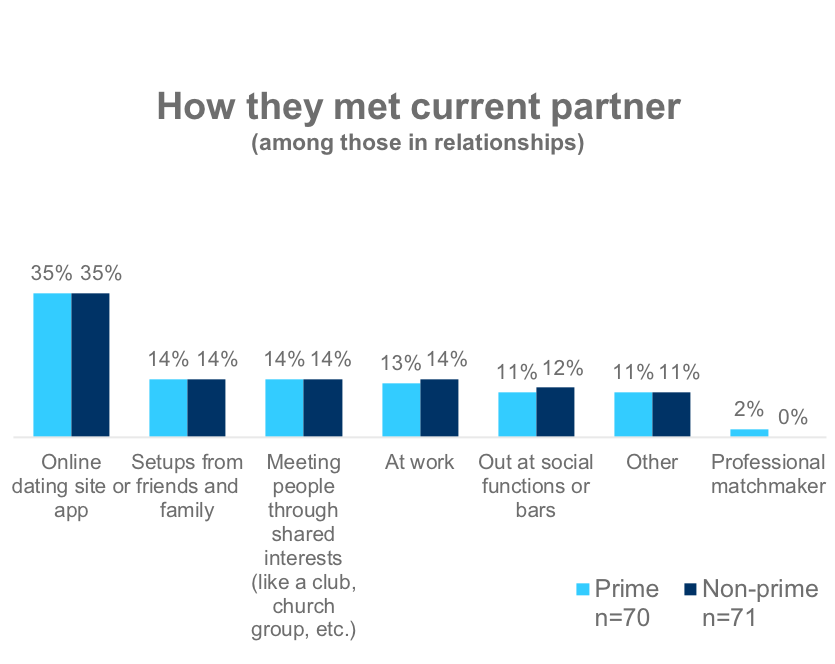
Q12- How did you meet your current partner?
Online dating site usage
Tinder is the top dating site among singles 18-44, regardless of credit group.
Prime singles over-index on Match, Bumble, eHarmony, OkCupid, Zoosk and Hinge, which all are paid or have premium options.
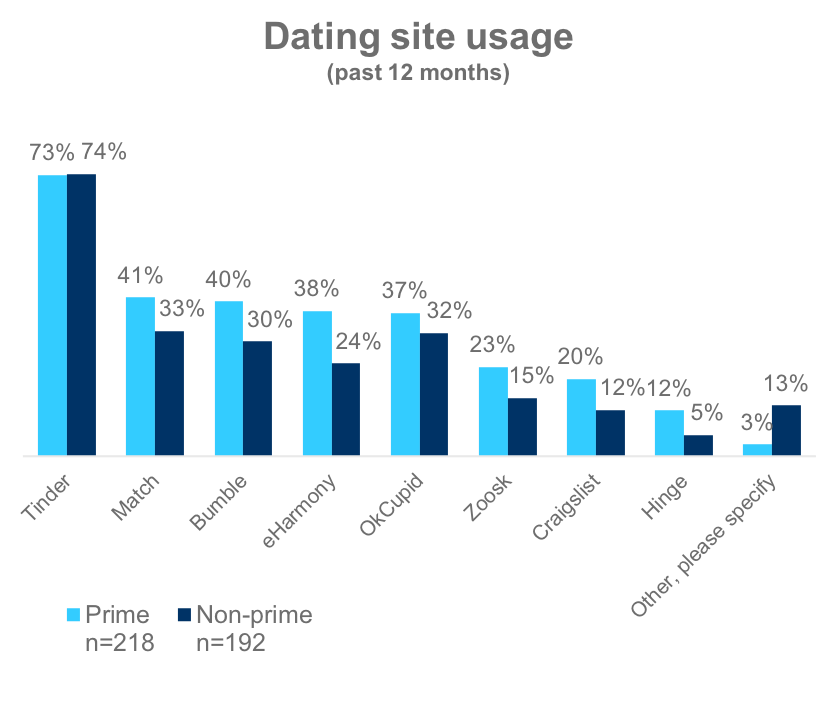
Q13- Which of the following online dating sites or apps have you utilized in the past 12 months? Please select all that apply
Online dating- average number of sites/apps
Prime men on average are on one more dating site than women and non-prime men.
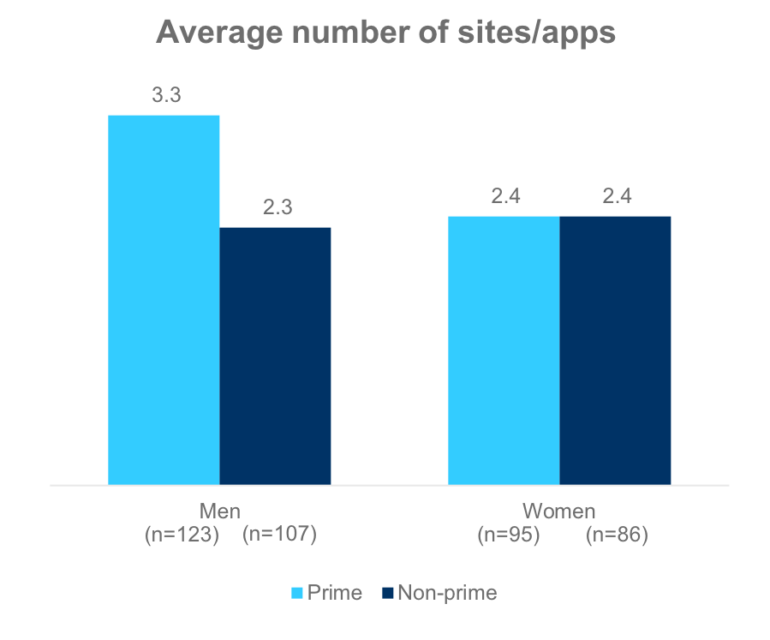
Q13- Which of the following online dating sites or apps have you utilized in the past 12 months? Please select all that apply. –Average number of selections per respondent
Overall experience with online dating
Non-prime singles are less likely to say they have had a positive experience in online dating, but there is no difference between non-prime men and women.
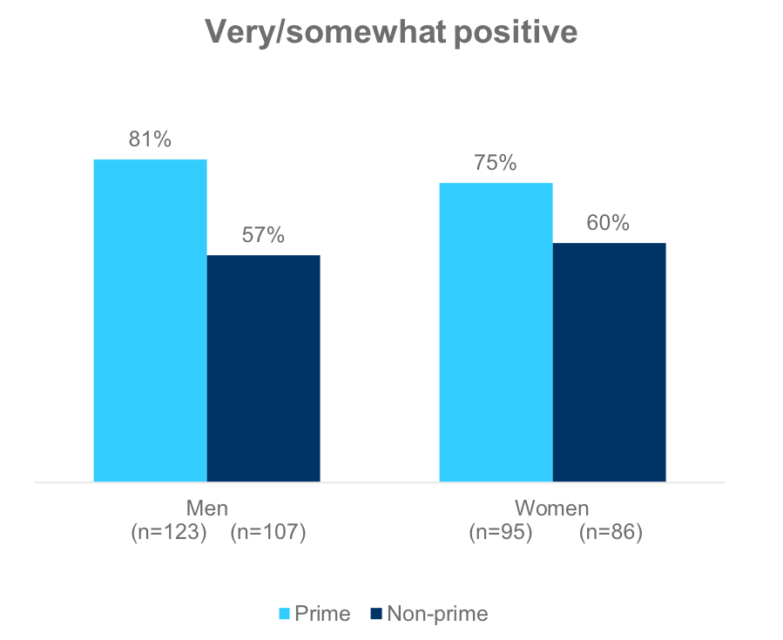
Q14 – How would you rate your experience with the following in the past 12 months?
Overall experience with setups from friends and family
Non-prime single women are least likely to have a positive experience with setups from friends and family compared to prime women and men in general.
Single prime women are less likely to have a positive experience compared to prime men.
Single men in both credit groups are equally likely to have said they had a positive experience with meeting dating prospects this way.
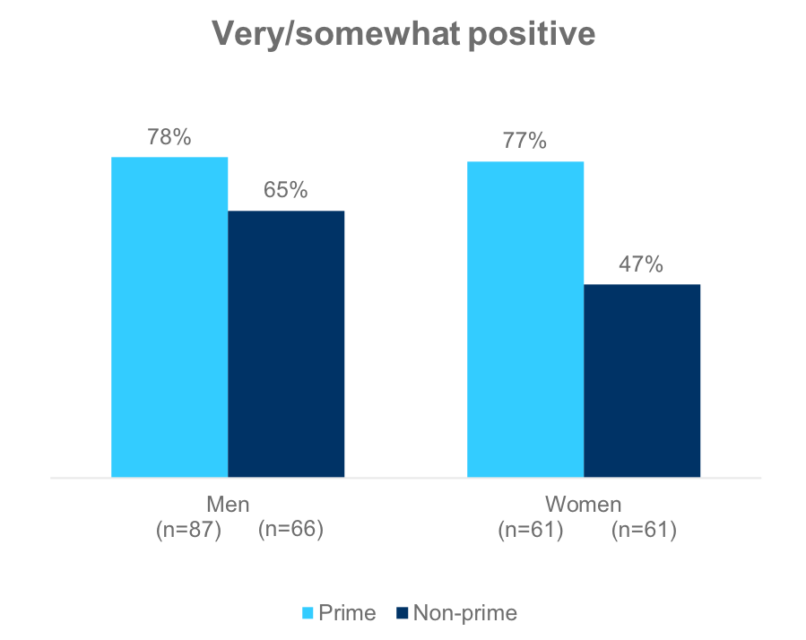
Q14 – How would you rate your experience with the following in the past 12 months?
Friendships and dating
Just as non-prime singles are less likely to find positive experiences in setups from friends and family, their social lives are also less centered on a group of friends, and they are less likely to have had their best romantic relationship develop out of a friendship.
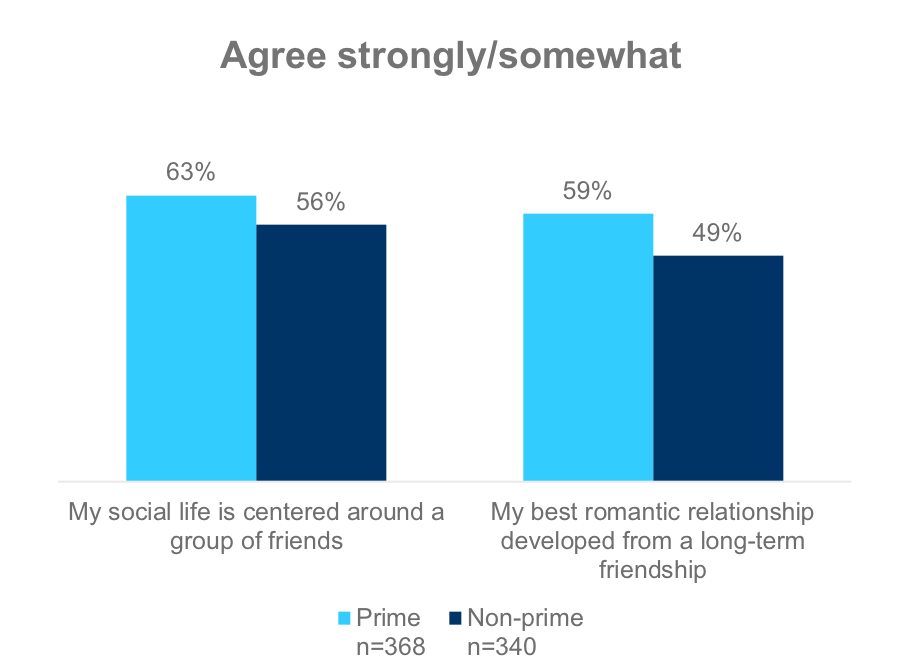
Q16 – How much do you agree or disagree with the following statements?
Overall experience with meeting people through shared interests
With all other groups being similarly likely to say they have had a positive experience meeting dating prospects through shared interests, non-prime single women are significantly less likely to say this is the case.
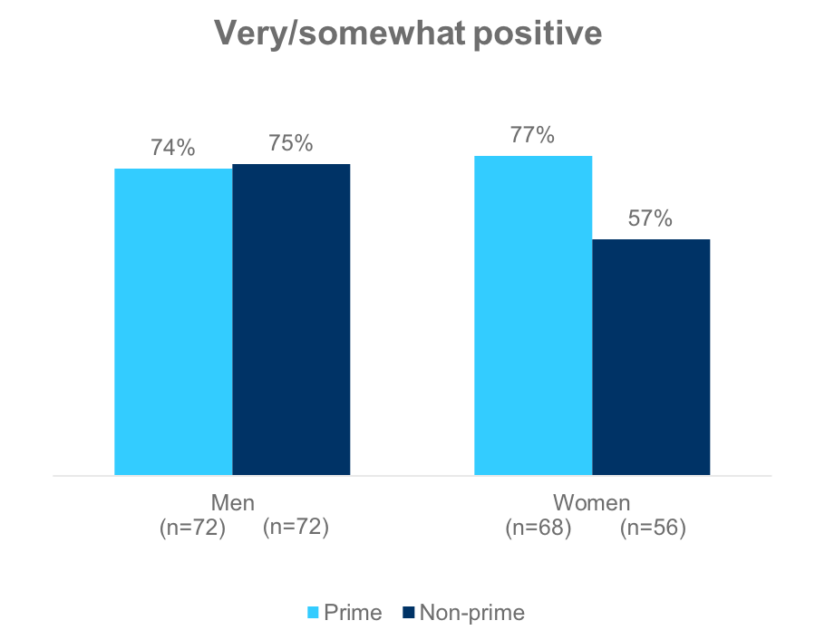
Q14 – How would you rate your experience with the following in the past 12 months?
Overall experience with meeting people through social functions and bars
Though single non-prime men and prime men have similar experience with meeting dating prospects through social functions and bars, non-prime women are significantly less likely to say they have had a positive experience doing so compared to prime women.
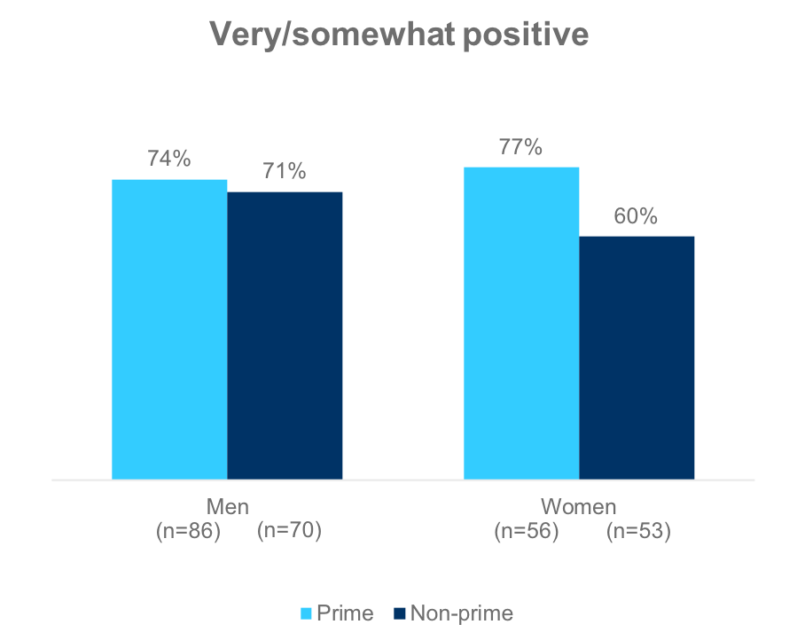
Q14 – How would you rate your experience with the following in the past 12 months?
Sentiment and influences in dating
Top Very important/ Important factors in selecting a romantic partner
The top 5 factors in selecting a romantic partner remain consistent between the two credit groups.
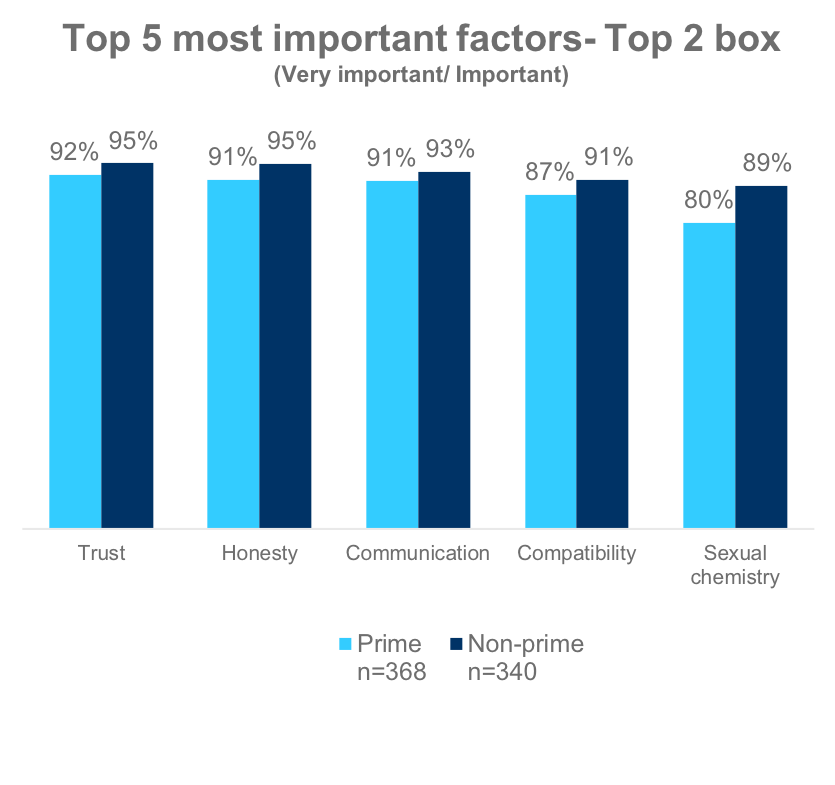
Q15 – Please indicate how important the following are in selecting a romantic partner
Top very important factors in selecting a romantic partner
The top 5 factors in selecting a romantic partner remain consistent between the two credit groups.
The non-prime is significantly more likely to say that trust and honesty are “very important.” These are nearly universally important traits, with more than 9 out of 10 respondents saying they are “very important” or “important.”
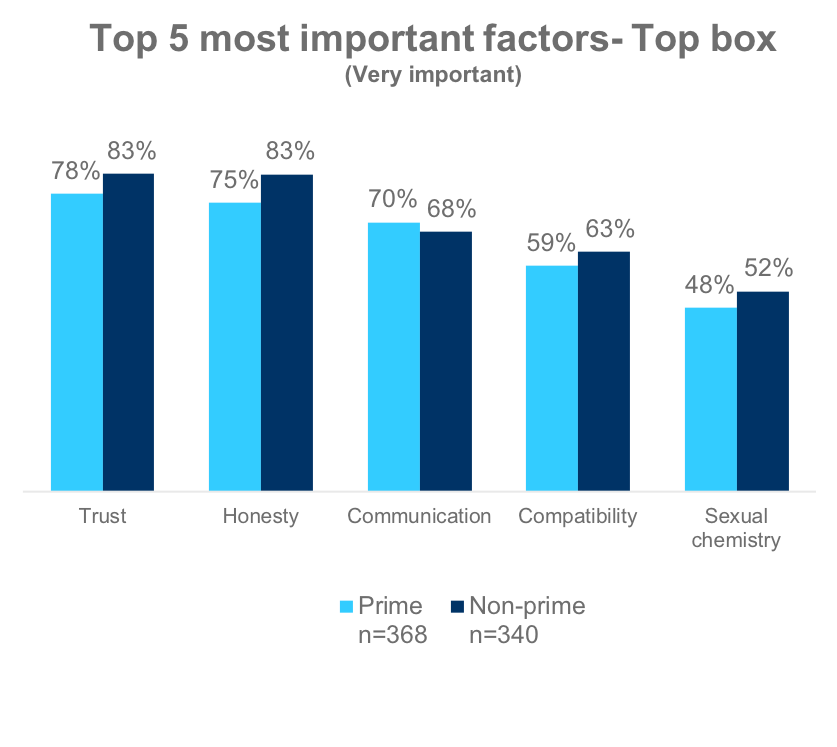
Q15 – Please indicate how important the following are in selecting a romantic partner
Debt as a factor in relationships (very important/important)
Single non-prime men are significantly less likely than their prime counterparts to say that debt is important in selecting a romantic partner.
While there was a slight difference between women, it was not significant.
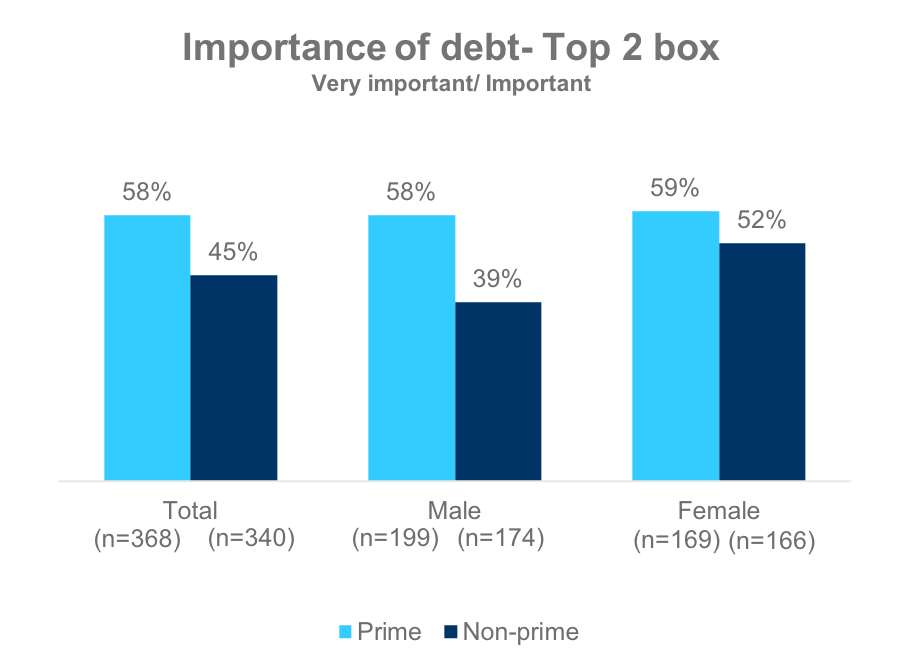
Q15 – Please indicate how important the following are in selecting a romantic partner
Job stability as a factor in relationships (very important/important)
Non-prime single men are the least likely to say job stability is important in selecting a romantic partner, while non-prime women are most likely to say so.
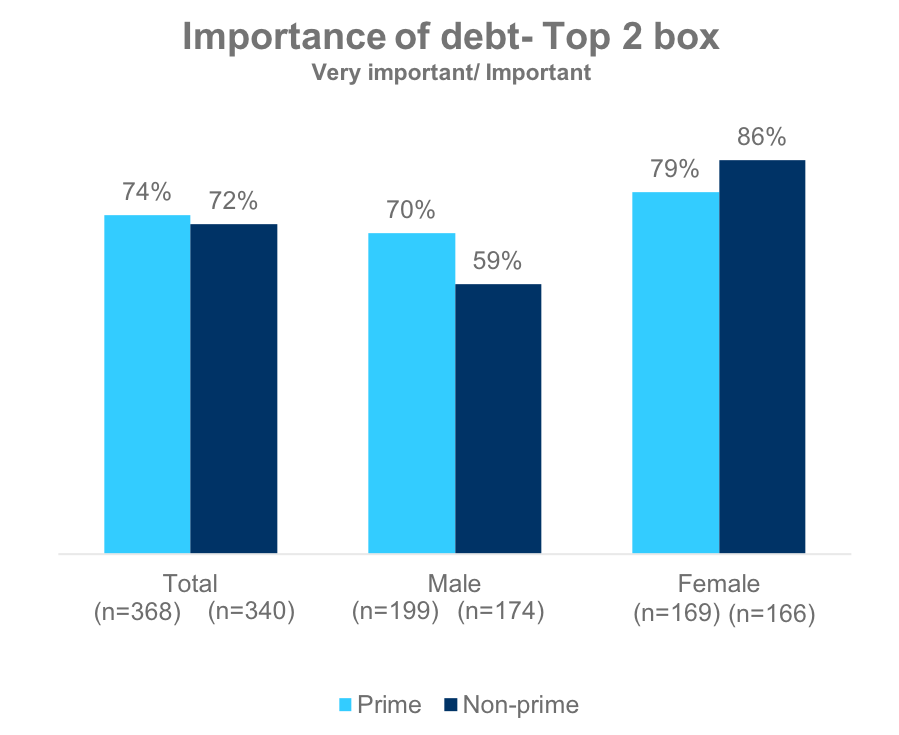
Q15 – Please indicate how important the following are in selecting a romantic partner
Financial stability as a factor in relationships (very important/important)
Single women in general are more likely to place importance in financial stability compared to men.
Single non-prime men are significantly less likely to say so than their prime counterparts.
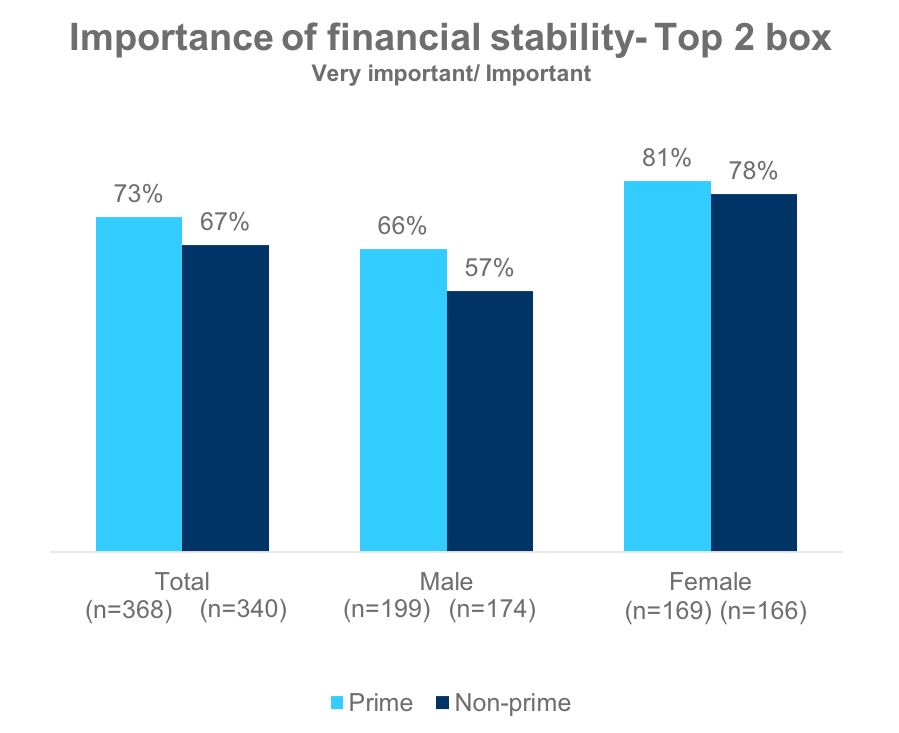
Q15 – Please indicate how important the following are in selecting a romantic partner
Sexual chemistry as a factor in relationships (very important/important)
Regardless of gender, the single non-prime are significantly more likely to say that sexual chemistry is “very important” or “important” in selecting a romantic partner.
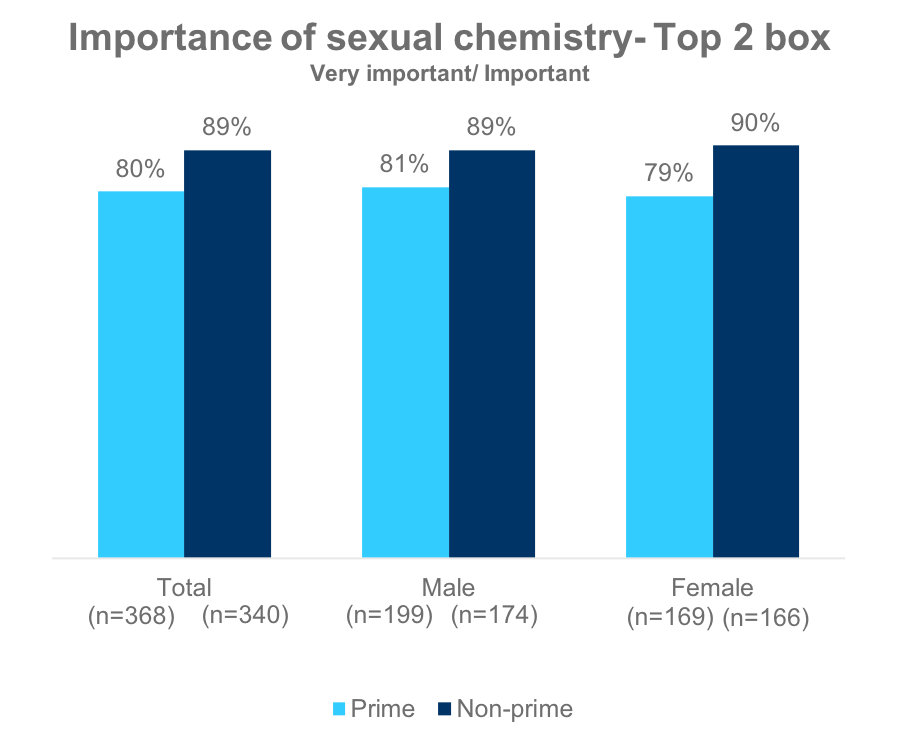
Q15 – Please indicate how important the following are in selecting a romantic partner
Discusses finances in the first 3 months of dating
Non-prime singles are less likely to discuss finances in the first three months of dating.
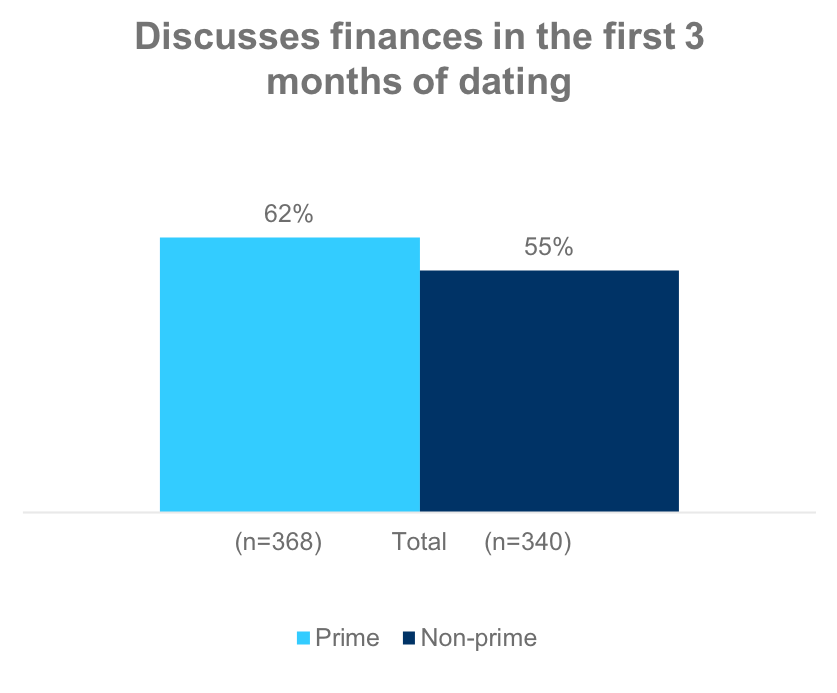
Q17 – How early into a new relationship would you typically first discuss finances? (on the first date, less than a month in, 1-3 months)
Financial confidence in dating
There is not a significant difference in confidence related to finances between single men by credit category. On the other hand, non-prime women are significantly less likely to get a boost in confidence in dating from their financial situation.
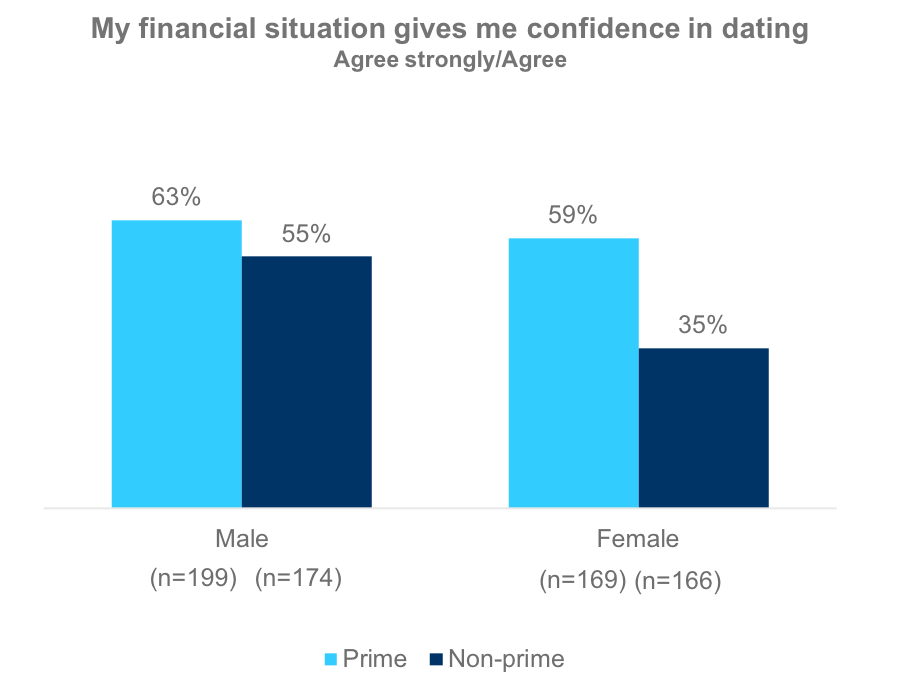
Q18 – How much do you agree or disagree with the following statements?
Finances as a consideration in dating
Non-prime singles in general, and non-prime men in particular, are less likely to believe a potential partner’s finances should be a consideration before pursuing a romantic relationship.
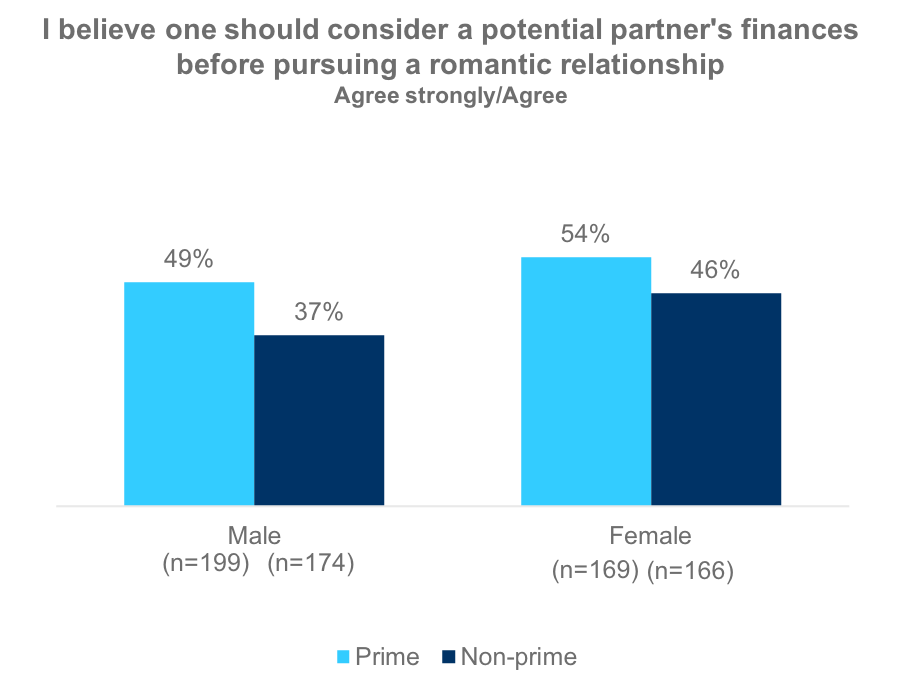
Q18 – How much do you agree or disagree with the following statements?
Financial independence in relationships
A majority of singles believe that it’s important to maintain financial independence as they pursue relationships, though women are most likely to believe this.
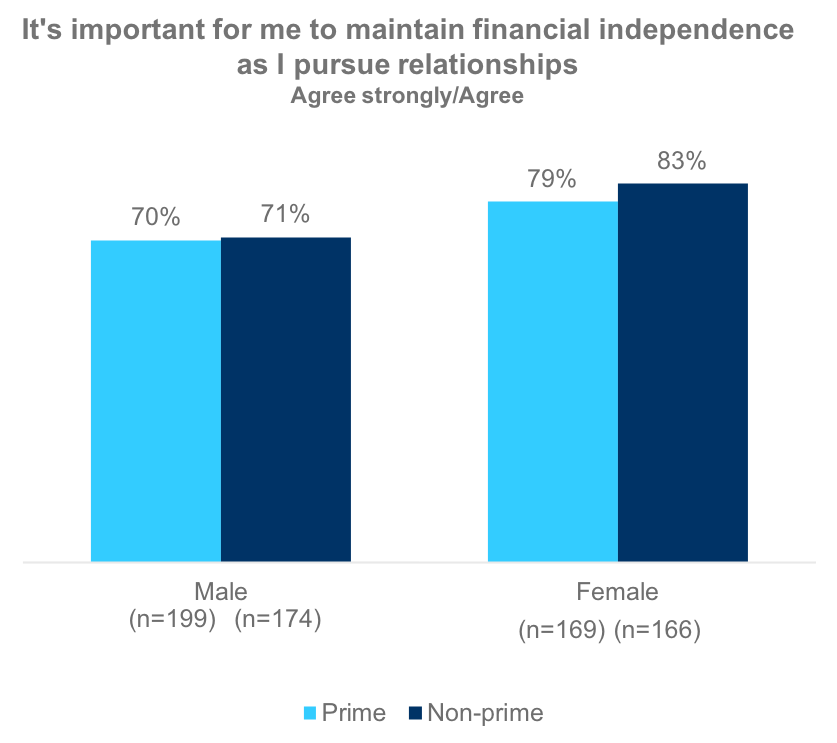
Q18 – How much do you agree or disagree with the following statements?
Financial equality between partners
Single non-prime men are less likely to believe that being financially equal is important in a relationship.
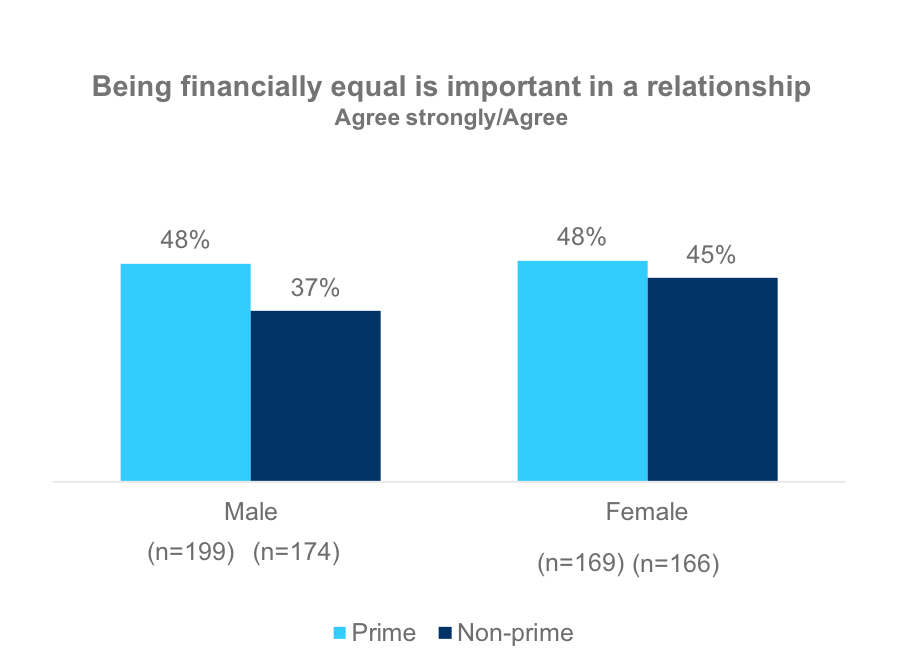
Q18 – How much do you agree or disagree with the following statements?
Dating someone who is unemployed
Single men, particularly non-prime men, are less likely to be hesitant regarding the risks of dating someone who is not currently employed.
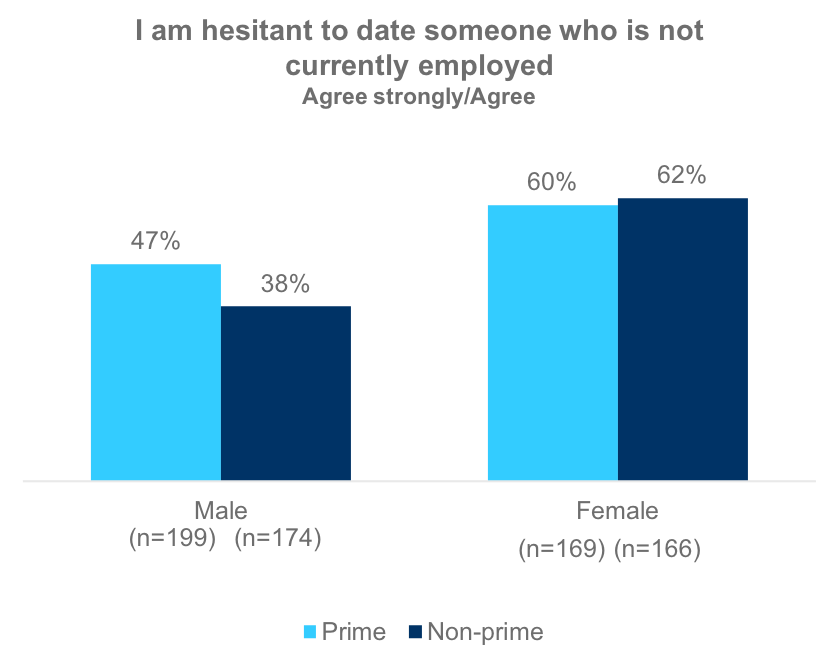
Q18 – How much do you agree or disagree with the following statements?
Snooping on a potential partner’s salary
Non-prime singles overall are about one-third less likely than prime singles to look up career and salary information of potential partners.
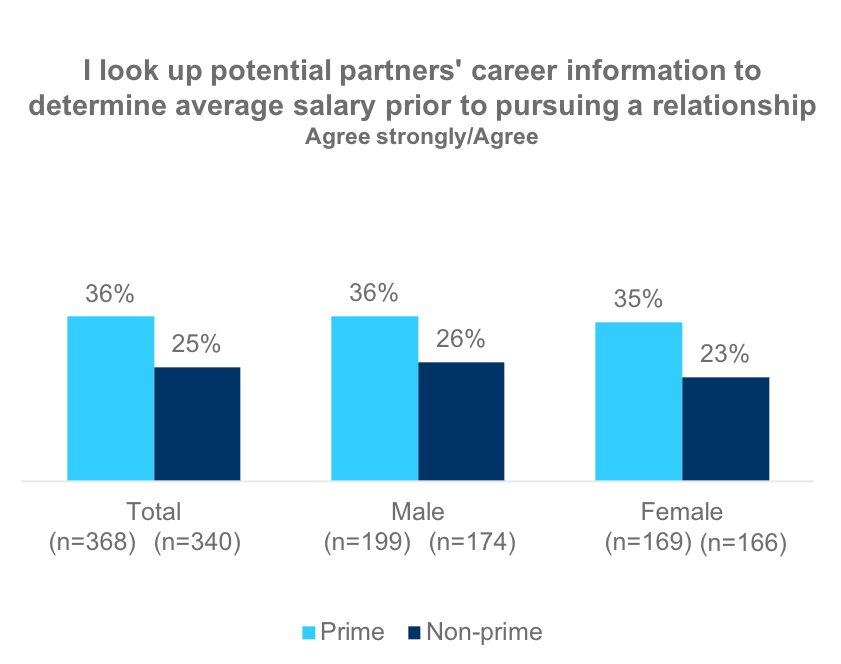
Q18 – How much do you agree or disagree with the following statements?
Spending time as a sign of affection
A majority of singles believe spending time is an important way to show you care.
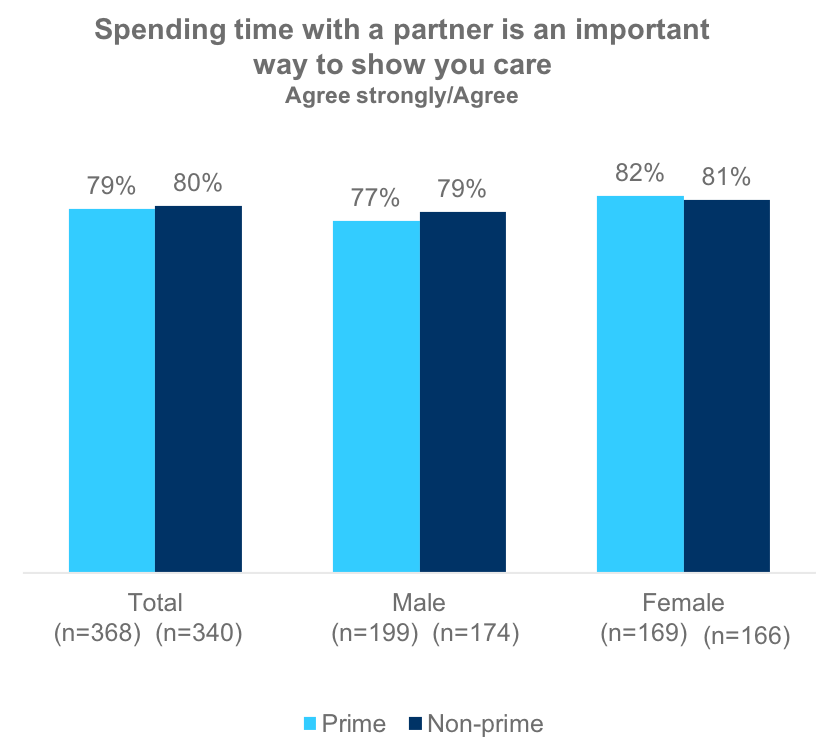
Q18 – How much do you agree or disagree with the following statements?
Spending money as a sign of affection
Compared to spending time, significantly fewer singles believe that spending money on a partner is an important way to show you care.
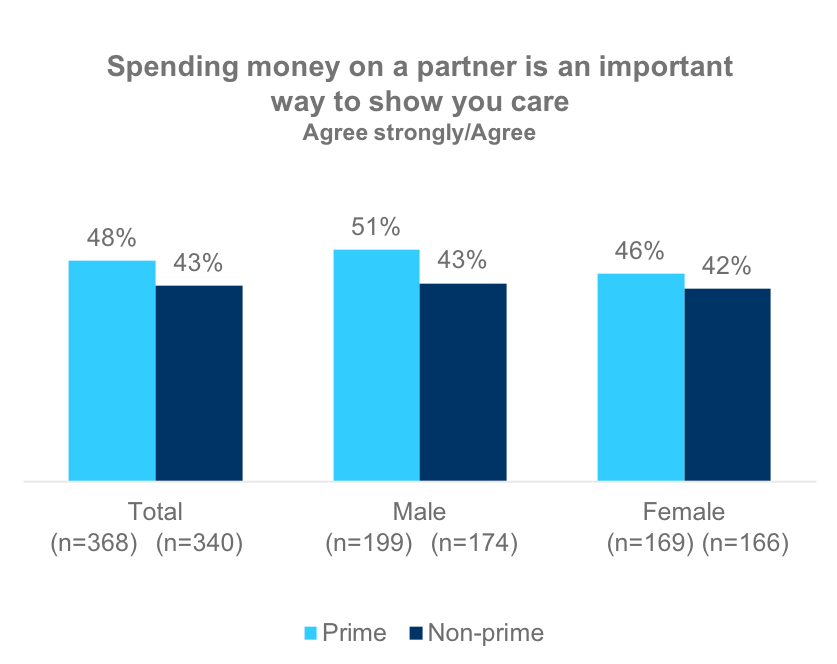
Q18 – How much do you agree or disagree with the following statements?
Adverse relationship events
A relationship unraveled due to my finances
Single men are about twice as likely to have had a relationship unravel due to their own finances, indicating there might be a more significant burden on men, though there seems to be no relationship with credit.
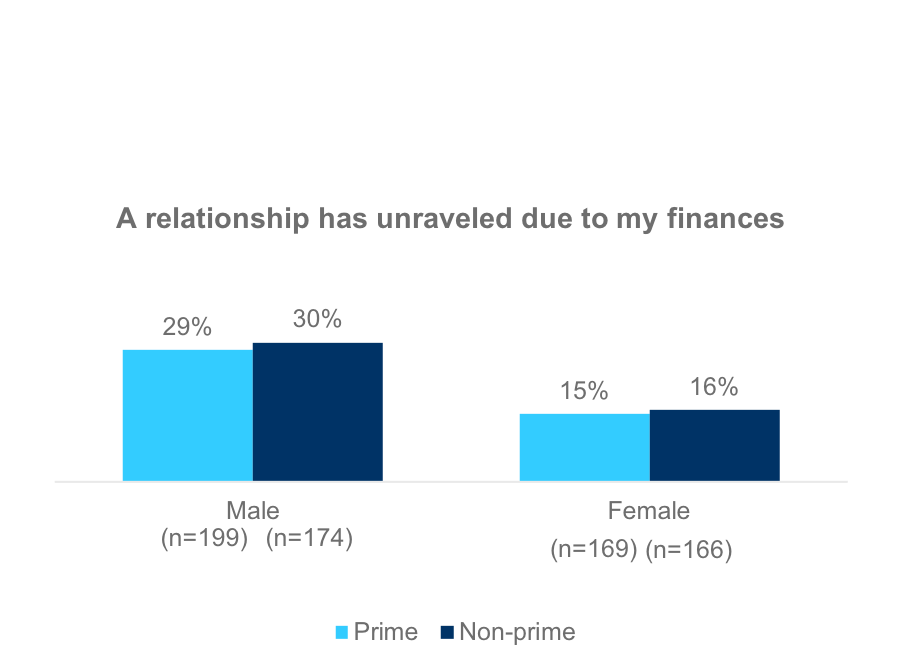
Q20 – Have you ever had any of the following happen in any of your romantic relationships or dating experiences?
A relationship unraveled due to my partner’s finances
Single non-prime women (about 1 in 3) are the most likely to have had a relationship unravel, which might explain their views on maintaining financial independence in relationships (83% say it’s important).
Interestingly, non-prime single men are less likely to have had this happen compared to their prime counterparts.
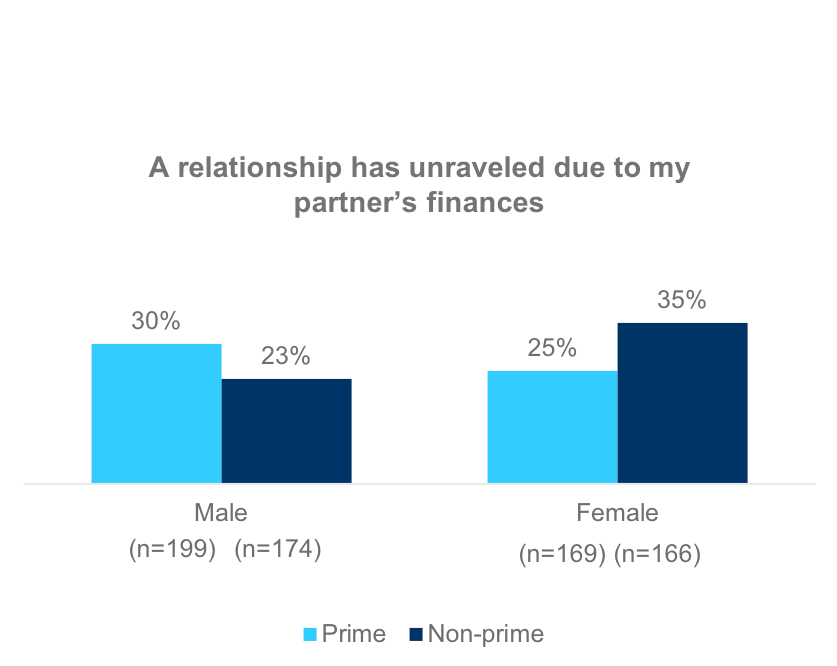
Q20 – Have you ever had any of the following happen in any of your romantic relationships or dating experiences?
Dishonest partners
Non-prime single women are 30% more likely than prime single women to have experienced a partner’s dishonesty regarding finances.
Men experience this fairly evenly regardless of credit.
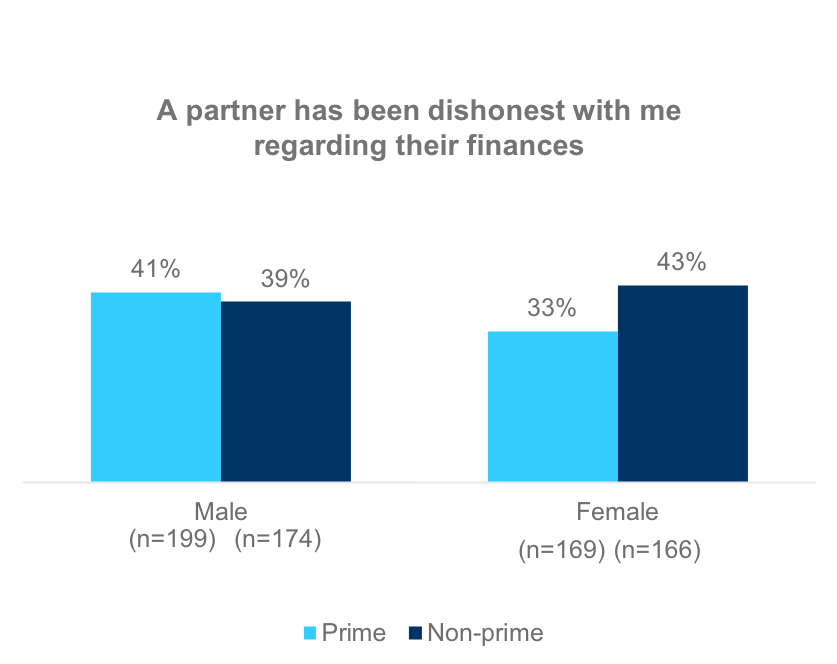
Q20 – Have you ever had any of the following happen in any of your romantic relationships or dating experiences?
My finances caused a potential partner to stop pursuing me
While single men regardless of credit status had similar incidence of relationships unraveling due to their finances, non-prime single men were 26% more likely to see a potential love interest stop pursuing them (ending things before they begin) over their finances.
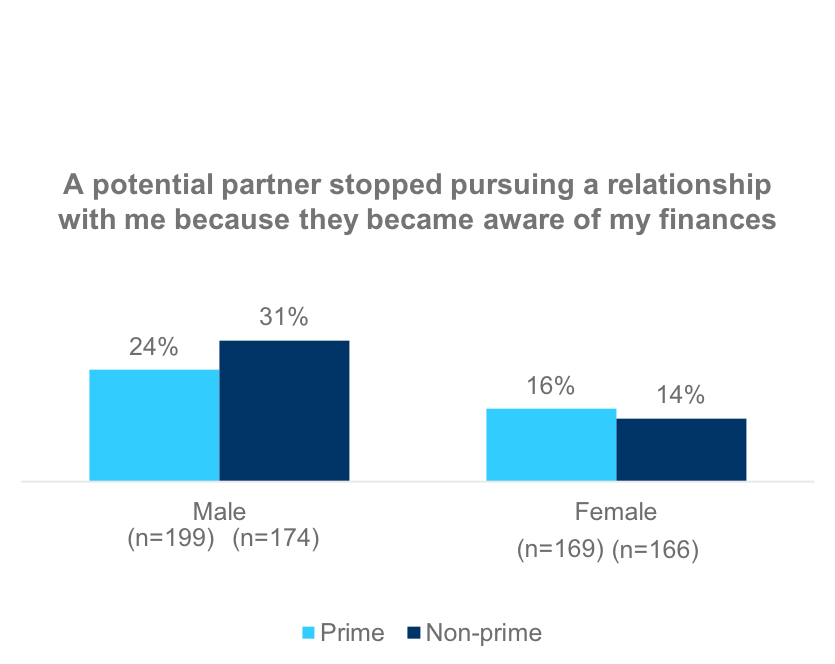
Q20 – Have you ever had any of the following happen in any of your romantic relationships or dating experiences?
Ignoring prospects based on career information
.Single non-prime men are about one-third less likely than all other groups to decide against messaging or ignore someone’s message based on career information
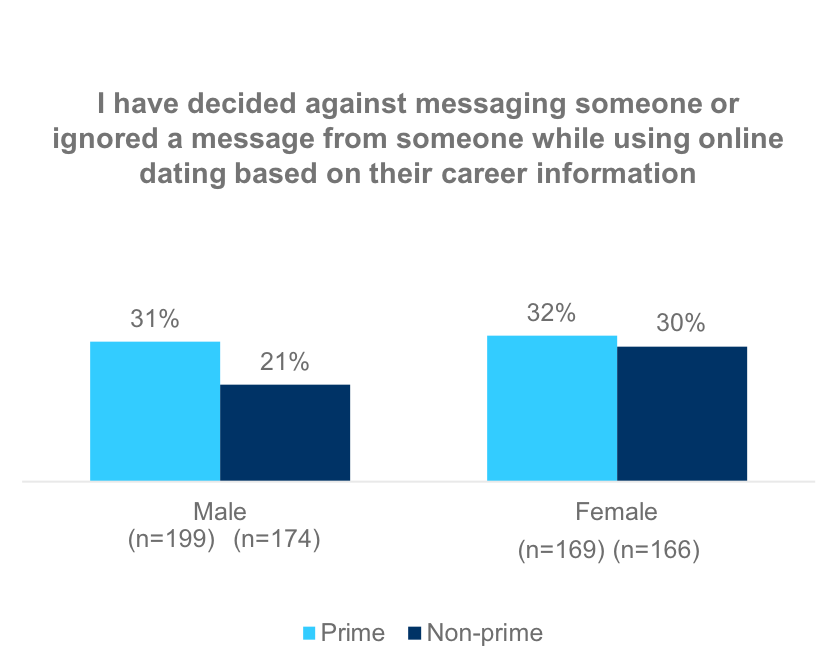
Q20 – Have you ever had any of the following happen in any of your romantic relationships or dating experiences?
Appendix
Methodology
The primary purpose of this study was to determine how non-prime Americans were similar or different from those with prime credit on a range of behaviors and attitudes.
Interview Dates: December 13, 2018 to December 31, 2018
Sample Specs:
•Total Respondents = 708
•Sample Source: Online panel
•Language: English
•
Qualification Criteria:
•Ages 18-44
•Personal income: $25k+
•Employment: not retired
•Is single (divorced, widowed, or never married)
•Not engaged or cohabiting with a partner
•In a relationship or open to romantic relationships
Survey Instrument: 8 minute questionnaire
About
Elevate’s Center for the New Middle Class
Elevate’s Center for the New Middle Class conducts research, engages in dialogue, and builds cooperation to generate understanding of the behaviors, attitudes, and experiences of America’s growing “New Middle Class.”
For more information, visit: www.elevate.com/NewMiddleClass
Contact
NewMiddleClass@elevate.com
@NewMidClass
Facebook.com/NewMiddleClass



